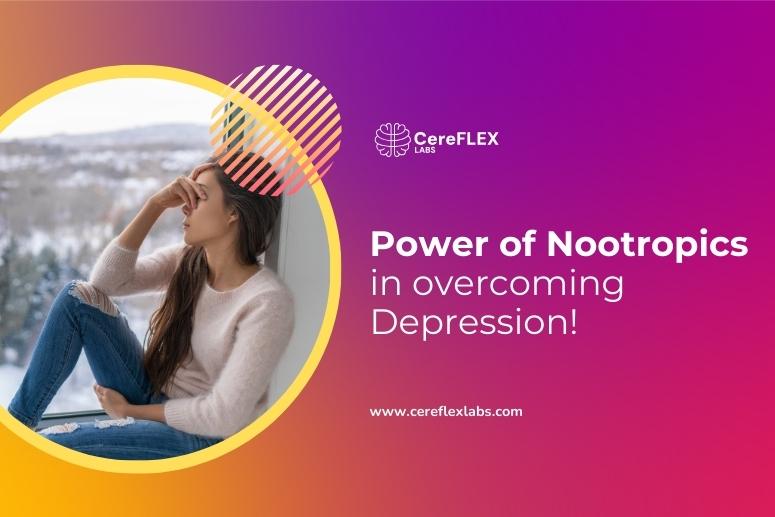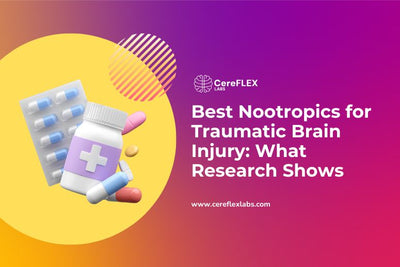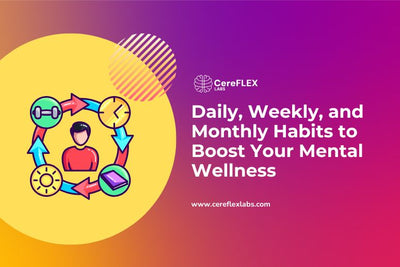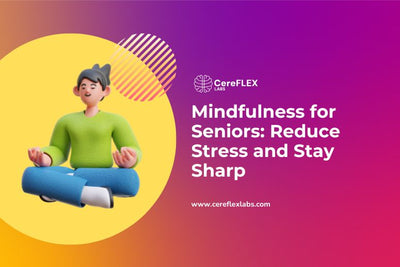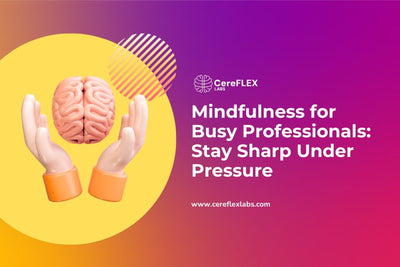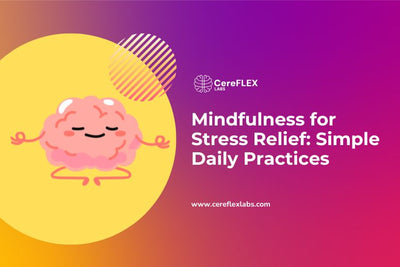Are you struggling with mood swings or mild depression and looking for alternatives to traditional antidepressants? You’re not alone. Many people are turning to nootropics—often called “smart drugs”—as a potential tool for enhancing mood and mental well-being.
While nootropics are best known for boosting cognitive function, emerging studies suggest they may also play a role in mood regulation and emotional balance by influencing key neurotransmitters like serotonin and dopamine. But how effective are they? Can these natural supplements truly support mental health, or do they fall short of traditional treatments?
In this guide, we’ll explore the science behind mood-enhancing nootropics, examine the research supporting their use for depression, and break down their potential benefits, risks, and limitations.
Common Nootropics for Depression
Nootropics are widely recognized for their cognitive-enhancing effects, but certain compounds may also support mood regulation and help manage symptoms of depression. Research suggests that some nootropics influence neurotransmitters like serotonin, dopamine, and GABA, which play key roles in emotional well-being.
Below are some nootropics that have been studied for their potential antidepressant properties:

Note: While some nootropics may help support mood regulation, they are not a replacement for professional depression treatments. If you are experiencing depression or are taking medication, consult a healthcare professional before using any nootropic to ensure safe and appropriate use.
L-Theanine
L-Theanine is a naturally occurring amino acid known for its calming and mood-enhancing effects. It may help reduce stress, anxiety, and mild depressive symptoms, while also improving sleep quality.1
Mechanisms of Action:
L-Theanine promotes relaxation without sedation by regulating key neurotransmitters:
- Increases GABA → Helps calm brain activity and reduce stress.
- Boosts serotonin and dopamine → Supports mood regulation and emotional stability.
- Balances glutamate → Prevents overstimulation, which can contribute to anxiety.
- Enhances alpha-wave activity → Promotes a relaxed, alert mental state.
Additionally, L-Theanine lowers cortisol (the stress hormone) and increases brain-derived neurotrophic factor (BDNF), which supports brain health and emotional resilience. These effects may contribute to improved mood and overall well-being.
Rhodiola Rosea
Rhodiola Rosea is an adaptogenic herb known for its ability to reduce stress, anxiety, and symptoms of depression. It may also help combat fatigue, improve mental clarity, and enhance motivation.
Mechanisms of Action:
Rhodiola Rosea helps regulate the body's stress response and mood balance through several mechanisms:
- HPA Axis Regulation → Supports the body's ability to manage stress, preventing cortisol overproduction.
- Boosts serotonin and dopamine → Enhances mood, motivation, and emotional stability.
- Increases β-endorphins → Promotes feelings of well-being and resilience to stress.
- Activates AMPA receptors → May improve cognitive function and emotional regulation.
- Enhances neurotransmitter precursor access → Improves the blood-brain barrier's ability to utilize serotonin and dopamine precursors, potentially amplifying antidepressant effects.
These combined effects may help reduce stress, enhance mood, and provide antidepressant-like benefits with fewer side effects than conventional medications.
Tryptophan or 5-HTP (5-Hydroxytryptophan)
Tryptophan is an essential amino acid found in protein-rich foods. The body converts tryptophan into 5-HTP (5-Hydroxytryptophan), a direct precursor to serotonin, the neurotransmitter responsible for mood regulation, sleep, and emotional well-being.
Since low serotonin levels are commonly linked to depression and anxiety, supplementing with tryptophan or 5-HTPmay help improve mood stability and stress resilience.3, 4
Mechanisms of Action:
Tryptophan follows two major metabolic pathways:
-
Serotonin & Melatonin Production → Tryptophan converts into 5-HTP, which is then used to synthesize serotonin (mood regulation) and melatonin (sleep regulation).
-
Neuroprotection & Stress Regulation → Some tryptophan is metabolized into kynurenic acid, which has neuroprotective effects and helps balance stress-related brain activity.
Additionally, nicotinic acid (vitamin B3) is produced in small amounts, supporting energy metabolism and brain function.
By enhancing serotonin levels, tryptophan and 5-HTP may help reduce symptoms of depression, improve sleep, and promote emotional balance.
Lion’s Mane
Lion’s Mane, often called the "smart mushroom," is a powerful nootropic known for its brain-boosting and mood-enhancing properties. It may help reduce anxiety and depression while improving focus, memory, and overall cognitive function.
Mechanism of Action
Lion’s Mane primarily works by stimulating Nerve Growth Factor (NGF), a protein essential for nerve cell growth, repair, and connectivity. Its key effects include:
-
Neurogenesis & Mood Regulation → By promoting new neuron formation and stronger neural connections, it may enhance brain plasticity, which is linked to better mood stability and emotional resilience.
-
Anti-Inflammatory & Antioxidant Protection → Reduces oxidative stress and neuroinflammation, both of which are associated with depression and cognitive decline.
-
Improved Stress Response → May help regulate cortisol (the stress hormone), contributing to a calmer, more balanced emotional state.
These combined effects suggest that Lion’s Mane may offer natural mood-enhancing benefits by protecting brain health and supporting neurotransmitter balance.
Ashwagandha
Ashwagandha is a well-known adaptogen that helps the body manage stress and improve emotional balance. Research suggests it may help reduce anxiety and depressive symptoms by regulating cortisol levels and neurotransmitter activity.6
Mechanism of Action:
Ashwagandha promotes stress resilience and mood stability through several key mechanisms:
-
Cortisol Reduction → Lowers stress hormone levels, preventing chronic stress from contributing to mood imbalances.
-
Neurotransmitter Support → Enhances GABA receptor function and balances serotonin levels, leading to a calmer, more stable emotional state.
-
Neural Repair & Cognitive Function → Supports the regeneration of axons and dendrites, helping restore brain function and improve mental clarity.
By modulating stress hormones and neurotransmitters, Ashwagandha may help alleviate anxiety, promote relaxation, and support overall mood health.
Nootropics and Depression: The Connection
Nootropics are gaining attention for their potential role in mood regulation and emotional well-being. While they are often associated with cognitive enhancement, research suggests that some nootropics may also support neurotransmitters like serotonin, dopamine, and GABA, which play a key role in mood stability.
Unlike traditional antidepressants that directly alter neurotransmitter levels, natural antidepressants like nootropics may modulate brain function in a more supportive way, helping the body regulate stress, mood, and mental clarity.
For many people, nootropics are not a replacement for prescription antidepressants but can serve as a complementary tool. Those with mild to moderate depression may find that combining nootropics with therapy, exercise, and a balanced diet helps manage symptoms and promotes overall well-being.
However, it’s essential to use nootropics carefully and consult a healthcare professional, especially for those with severe depression or existing medications. When integrated into a broader mental health plan, nootropics may offer a natural option for mood support.
Benefits of Nootropics for Depression
While nootropics are not a substitute for therapy or medication, some may help alleviate symptoms of depression, anxiety, and fatigue. These cognitive enhancers work by supporting neurotransmitter balance, reducing stress hormones, and improving overall brain function—all of which play a role in emotional well-being.
Here’s how nootropics may assist those managing depression:

1. Mood Enhancement: Improving Well-being
Nootropics may help stabilize mood and promote emotional balance by supporting key neurotransmitters like serotonin, dopamine, and GABA, which play crucial roles in mood regulation and stress resilience. By influencing these brain chemicals, nootropics can enhance well-being and potentially reduce symptoms of depression.
For example:
Bacopa monnieri is one of the best nootropics for mental health and is widely used for cognitive enhancement. It is believed to have antidepressant properties, primarily by modulating serotonin and dopamine levels, which may help reduce anxiety and depressive symptoms.
Research suggests that Bacopa monnieri functions as a mild mood stabilizer rather than a potent treatment. One study found that older adults who used Bacopa experienced lower levels of anxiety, while another showed that individuals taking Bacopa had fewer depressive symptoms compared to a placebo group.
2. Reduced Anxiety and Stress: Helping Manage Anxiety
Anxiety and depression often go hand in hand, making it challenging to manage both conditions. Many nootropics help regulate stress hormones and neurotransmitters like GABA and serotonin, which are essential for calming the nervous system and reducing feelings of anxiety.
For example:
Panax Ginseng is a well-known adaptogen that helps the body cope with stress and combat fatigue. It works by reducing oxidative stress8, which is linked to neuroinflammation and heightened anxiety responses. Additionally, Panax Ginseng enhances GABAergic activity, supporting a calmer, more balanced emotional state.
The calming effects of these nootropics are especially helpful for those who feel overwhelmed by chronic stress and worry. By reducing anxiety, they not only improve mood but also enhance overall mental well-being.
Improved Energy and Focus: Combating Mental Fog and Low Energy
Depression often brings low energy, poor concentration, and mental fog, making even simple tasks feel overwhelming. Certain nootropics help combat these symptoms by enhancing brain energy production and neurotransmitter function, leading to improved focus, motivation, and mental clarity.
For example:
Citicoline is a unique choline-based nootropic known for its role in boosting energy and cognitive function. It provides two essential compounds:
- Choline, which supports the production of acetylcholine, a neurotransmitter involved in focus and memory.
- Cytidine, which converts into uridine, playing a key role in neuronal repair and energy metabolism.
Unlike standard choline supplements, Citicoline also increases ATP production in brain cells, providing sustained mental and physical energy. Cognizin® Citicoline, a patented form, has been shown to enhance memory, learning, and overall cognitive performance—making it particularly beneficial for those experiencing depression-related fatigue and brain fog.
Side Effects and Risks of Nootropics
While nootropics can enhance mood, cognitive function, and energy, they also come with potential side effects and interactions. Understanding the side effects of nootropics and their risks is essential for safe and effective use.
Nootropics Common Side Effects
Some nootropics may cause mild to moderate side effects, especially when taken in high doses or on an empty stomach.
-
Nausea → More likely when nootropics are taken on an empty stomach. Eating before taking them or reducing the dose may help.
-
Headaches → Certain nootropics (e.g., Rhodiola Rosea, Bacopa monnieri) may trigger mild headaches due to neurotransmitter fluctuations. Staying hydrated and pairing them with choline supplements may reduce discomfort.
- Digestive Issues → Some compounds (e.g., Bacopa monnieri) can cause bloating or indigestion. Taking them with food may help minimize these effects.
Drug Interactions
Although nootropics are often considered "natural," they can still interact with prescription medications, sometimes leading to undesirable effects.
1. Antidepressants & Nootropics
Nootropics that influence serotonin or dopamine levels may interact with antidepressants, leading to two types of drug interactions:
Additive Effects → When both substances increase the same neurotransmitter, it may lead to excessive stimulation.
- Example: Taking 5-HTP with SSRIs may cause serotonin syndrome, a potentially dangerous condition.
Antagonistic Effects → When a nootropic counteracts the effects of a medication, reducing its effectiveness.
- Example: GABA supplements may weaken stimulant-based ADD/ADHD medications.
2. Other Medications
Nootropics may also interact with:
-
Mood stabilizers (e.g., lithium, lamotrigine) → Some adaptogens like Rhodiola Rosea may alter neurotransmitter sensitivity, potentially reducing medication efficacy.
-
Anti-anxiety drugs (e.g., benzodiazepines) → Some nootropics, such as high-dose L-Theanine, may enhance sedation, leading to excessive drowsiness.

Precautions for Safe Use
To minimize risks, follow these guidelines:
✅ Start low and go slow → Begin with a small dose to see how your body reacts before increasing.
✅ Monitor side effects → Track any negative reactions and discontinue if discomfort persists.
✅ Consult a healthcare provider → Especially if you take medications, have mood disorders, or have underlying health conditions.
✅ Choose high-quality supplements → Opt for trusted brands to avoid impurities, poor formulations, or contaminants.
While many people tolerate nootropics well, they are not suitable for everyone. Those with pre-existing conditions (e.g., bipolar disorder, severe anxiety, or heart conditions) should exercise caution and seek medical advice before use.
Conclusion
Nootropics may offer mood-enhancing benefits and help alleviate symptoms of depression and anxiety, but they should not replace professional medical treatments. Some, like Rhodiola Rosea, Bacopa monnieri, and L-Theanine, have shown promising effects in improving mood, stress resilience, and cognitive function. However, while early research is encouraging, more clinical studies are needed to confirm their long-term effectiveness for depression management.
Because nootropics can have side effects and interact with medications, it’s essential to use them responsibly. Always consult a healthcare professional before incorporating any new supplement, especially if you are taking antidepressants or other mood-related medications.
If you’re exploring natural options to support brain health and mental clarity, CereFLEX Labs offers research-backed nootropic formulations designed to enhance cognitive performance and overall well-being. Our products are formulated with high-quality ingredients, ensuring purity, effectiveness, and safety.
Discover the benefits of nootropics today—visit CereFLEX Labs to explore natural, evidence-based supplements that support mental performance and cognition.
Disclaimer: Always consult a healthcare professional before starting any supplement, especially if you have underlying health conditions or are recovering from a brain injury.
FAQs
1. Do nootropics really help with depression?
Nootropics may support mood regulation by influencing neurotransmitters like serotonin and dopamine. While some people find them helpful, their effectiveness varies, and they should not replace professional depression treatment.
2. What are the best nootropics for mood improvement?
Rhodiola Rosea may reduce stress-related fatigue, Bacopa monnieri is believed to support serotonin function, and L-Theanine promotes relaxation by enhancing GABA and dopamine activity.
3. Are nootropics better than antidepressants for depression?
No, nootropics are not a replacement for antidepressants. While they may support mood and cognition, antidepressants remain the primary treatment for clinical depression. Some people use nootropics alongside therapy or medication for additional support.
4. Can Rhodiola Rosea reduce depression symptoms?
Studies suggest Rhodiola Rosea may help alleviate mild to moderate depression by reducing fatigue and improving stress resilience, but more research is needed to confirm its effectiveness.
